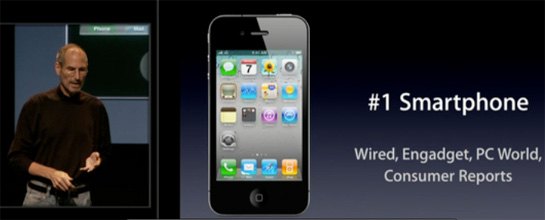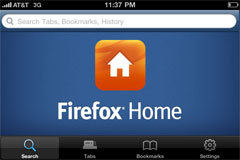
(Photo borrowed from Engadget’s live coverage.)
So much for the theory that Apple was going to announce a miracle cure for iPhone 4 reception issues this morning. At the press conference on Apple’s campus, Steve Jobs offered several measures to make current and prospective iPhone 4 owners comfortable with their purchase–but he defended the iPhone 4 against charges that it has unique problems with reception, and didn’t say that Apple could or would eliminate the possibility that holding the iPhone 4 by the lower left-hand corner would hurt its performance.
Jobs showed the results of Apple’s tests of other smartphones–the BlackBerry 9700, the Droid Eris, and the Samsung Omnia II–indicating that their signal strength also drops when they’re held.
He then quoted stats that suggest most users aren’t encountering crippling new reception issues. Only .55 percent of iPhone 4 buyers have called AppleCare with antenna- or reception-related problems; just 1.7 percent of people who bought iPhone 4s from AT&T have returned them (with the iPhone 3GS, it was six percent). According to AT&T, the iPhone 4 drops calls more frequently than the iPhone 3GS–but only by one additional dropped call per 100 calls.
Jobs shared a pet theory: Because the iPhone 4 has a new shape that requires new cases, only twenty percent of buyers leave the Apple Store with a case, versus eighty percent of iPhone 3GS buyers who did. Since it’s using the iPhone 4 without a case that reveals the reception issue, it may just be that more iPhone 4 owners have been exposed to troublesome reception scenarios.
And then he explained how Apple would respond to the iPhone 4 issue:
- He recommended that all iPhone 4 users upgrade to iOS 4.0.1, which provides a more accurate depiction of signal strength;
- Apple will provide a free iPhone 4 case–Apple’s bumper or another model, since there aren’t enough bumpers to go around–to everyone who has bought a phone or will buy one between now and September 30th;
- Customers who are still unhappy can bring their iPhone 4 back within thirty days for a full refund, with no restocking fee;
- Apple is looking into the issues that have been reported with the iPhone 4’s proximity sensor, and hopes to fix them in the next software update;
- By the end of this month, the white iPhone 4 will be shipping and the iPhone 4 will be available in another seventeen countries.
During the Q&A that followed–which is still going on as I write this–Jobs said that Apple doesn’t have a better antenna design (maybe the next iPhone will have one, he said) and that a Bloomberg story which said an Apple engineer had warned him about the iPhone 4 antenna was “bullshit.”
Throughout, Jobs talked about how hard Apple works to make its customers happy, and how much it loves those customers. He said that Apple isn’t perfect, and didn’t deny that the iPhone 4’s antenna design can cause problems.
So does this end controversy over the iPhone 4? No, I don’t think that anyone, including Jobs, believes that. But it may put the final verdict in the hands of iPhone 4 owners rather than the media or Apple. If millions of people buy the iPhone 4 and don’t encounter any unique reception difficulties, they’ll tell their friends and the phone’s rep will quickly heal. And if those millions of people do find the phone unreliable, they’ll tell their friends that, too.
(Me, I’ve found that my iPhone 4 seems to have good-to-very-good reception in most instances–except when I entered a zone of weak AT&T signal and found that how I held the phone made a huge difference.)
More thoughts to come, but here’s one aspect of all this that cries out for further exploration. In today’s press conference, Jobs showed other phones suffering from reception issues that looked a lot like those that the iPhone 4 can encounter. But when Consumer Reports decided not to recommend the phone, it did so based on tests of the iPhone 4 and other phones which indicated that the 4 has problems that other phones don’t. The “other phones” involved were different, so the conclusions weren’t inconsistent. But I’d like to see CR or another third party with the resources and know-how perform further testing of this sort.
So if you followed the press conference this morning, what’s your take on Apple’s response? Do you think the company is done addressing this?
![]() Music service MOG has launched the iPhone and Android apps I wrote about last month. For $9.99 a month, you get unlimited streaming and album downloads in your browser and on your device. And MOG has a unique “artist radio” feature that can play only songs by that artist, rather than the more typical combination of songs by the artist, related artists, vaguely-similar artists, and not-similar-at-all artists.
Music service MOG has launched the iPhone and Android apps I wrote about last month. For $9.99 a month, you get unlimited streaming and album downloads in your browser and on your device. And MOG has a unique “artist radio” feature that can play only songs by that artist, rather than the more typical combination of songs by the artist, related artists, vaguely-similar artists, and not-similar-at-all artists.
 Apple’s FileMaker subsidiary offers two database applications: Its namesake, FileMaker Pro (aimed mostly at business users) and Bento (meant mostly for consumers). Bento
Apple’s FileMaker subsidiary offers two database applications: Its namesake, FileMaker Pro (aimed mostly at business users) and Bento (meant mostly for consumers). Bento  So did Apple mollify the world with the press conference it held on Friday to respond to charges that the iPhone 4’s antenna design is seriously flawed? Fortune’s Philip Elmer-DeWitt has
So did Apple mollify the world with the press conference it held on Friday to respond to charges that the iPhone 4’s antenna design is seriously flawed? Fortune’s Philip Elmer-DeWitt has 

 Firefox has arrived on the iPhone–sort of.
Firefox has arrived on the iPhone–sort of.